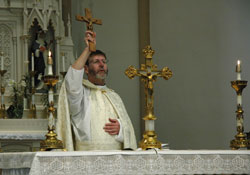Sacraments rooted in Christ’s dying, rising, priest explains

Jesuit Father Mitch Pacwa blesses the congregation during a celebration of the Maronite Rite Divine Liturgy on April 21 at St. Louis Church in Batesville.
By Sean Gallagher
BATESVILLE—Speaking during the heart of the Easter season, Jesuit Father Mitch Pacwa recently reflected on how the sacraments are rooted in the death and resurrection of Christ during a daylong seminar on April 21 at St. Louis Church in Batesville.
The seminar was sponsored by the archdiocesan-based Abba Father Chapter of Catholics United for the Faith.
Regarding baptism, Father Pacwa, using the New Testament as his guide, explained how the baptized person is joined to Christ’s dying and rising.
The grace of baptism then unfolds as the baptized person seeks to avoid sin.
“To be able to resist those temptations is not simply an act of my will,” Father Pacwa said. “It’s going to be dying with Jesus. And we need to make that explicit in the way that we call ourselves to live our baptismal life.”
Father Pacwa showed how baptism is more than simply dying with Christ.
“There’s a peace that only Christ gives, that peace of Easter, that joy of Easter which permeates the Christian’s life because in dying to ourselves, we truly have risen with Christ,” he said.
Father Pacwa said that through confirmation the Holy Spirit is given in a special way not only to lead people to recognize their sins and so die to them, but also to empower them for a particular service within the Church.
During the middle of the seminar, Father Pacwa celebrated the Divine Liturgy according to the Maronite Rite, which is the liturgical tradition of the Maronite Church. It is historically based in Lebanon and an eastern Catholic Church in union with the pope.
During his homily, Father Pacwa noted that at the Eucharist, the faithful, along with Christ, offer their spiritual sacrifices, which include “fighting against temptation, dying to ourselves [and] the charity we show others.”
He explained how Christ, when we receive Communion, helps us to “live out [the] hope” that our sacrifices will be fulfilled in him.
Father Pacwa reflected on Christ’s words from the cross, “Father, forgive them. They know not what they do” (Lk 23:34), when speaking about confession after the liturgy.
“It’s in the confessional that you meet Jesus Christ and him crucified,” he said. “And he’s saying to you, ‘Father, forgive him, forgive her, for they know not what they’re doing.’ He’s repeating that and the power of his cross is there.”
Father Pacwa also explained how on the night of the Resurrection, Christ passed on that power to his Apostles.
In reflecting on the other sacrament of healing, the anointing of the sick, Father Pacwa showed his listeners how through it we can join our suffering to Christ’s pain.
“Part of the good news for us is that we who have experienced pain [can] join it to Christ on the cross,” he said. “It’s not meaningless. It’s not hopeless.”
He also showed how through the anointing of the sick the faithful are brought closer to the healing power of the Resurrection.
“[Jesus’] scars are glorified and that’s why they are perpetually available to us to have healing given to us in the spiritual, emotional and physical realm,” Father Pacwa said.
He ended the seminar by exploring the sacraments of vocation: marriage and holy orders.
Father Pacwa noted how spiritual writers throughout history have seen the creation of the Church, the bride of Christ, in the water and blood that flowed from Christ’s pierced side.
He said with a chuckle that in dying for his bride, Christ “is not enthroned on an easy chair. He’s not Archie Bunker.
“No, he’s enthroned on a cross,” Father Pacwa said. “This is the model for husbands to love their wives to death.”
He next turned to the vision of the wedding feast of the lamb portrayed in the Book of Revelation.
“Marriage is a sign of that second coming of Jesus, that the fidelity that a husband and wife show each other is a sign of the second coming,” Father Pacwa said.
In the final portion of the seminar, Father Pacwa reflected on how Christ’s priesthood was lived out most fully in his death, resurrection and ascension to heaven. He showed how Christ’s priesthood is perpetuated in a special way through priests who confer and stand as a witness to all the sacraments.
“In each of our sacraments, [Christ] makes present to us what is forever present to him,” he said. “And that’s how we enter into these mysteries of his death and Resurrection.”
“Our task is to proclaim that faith to the members of our own Church, but [also] to members of other Churches, to Muslims, to atheists, to let them know that this is good news,” Father Pacwa said.
Diane Helcher, a member of St. Teresa Benedicta of the Cross Parish in Bright, gained a new, challenging perspective on the sacraments from the seminar.
“I never really thought a lot about the sacraments as part of the death and Resurrection,” she said. “Unfortunately, it’s going to be hard. It’s dying to yourself and being able to go out and to give to others.” †
